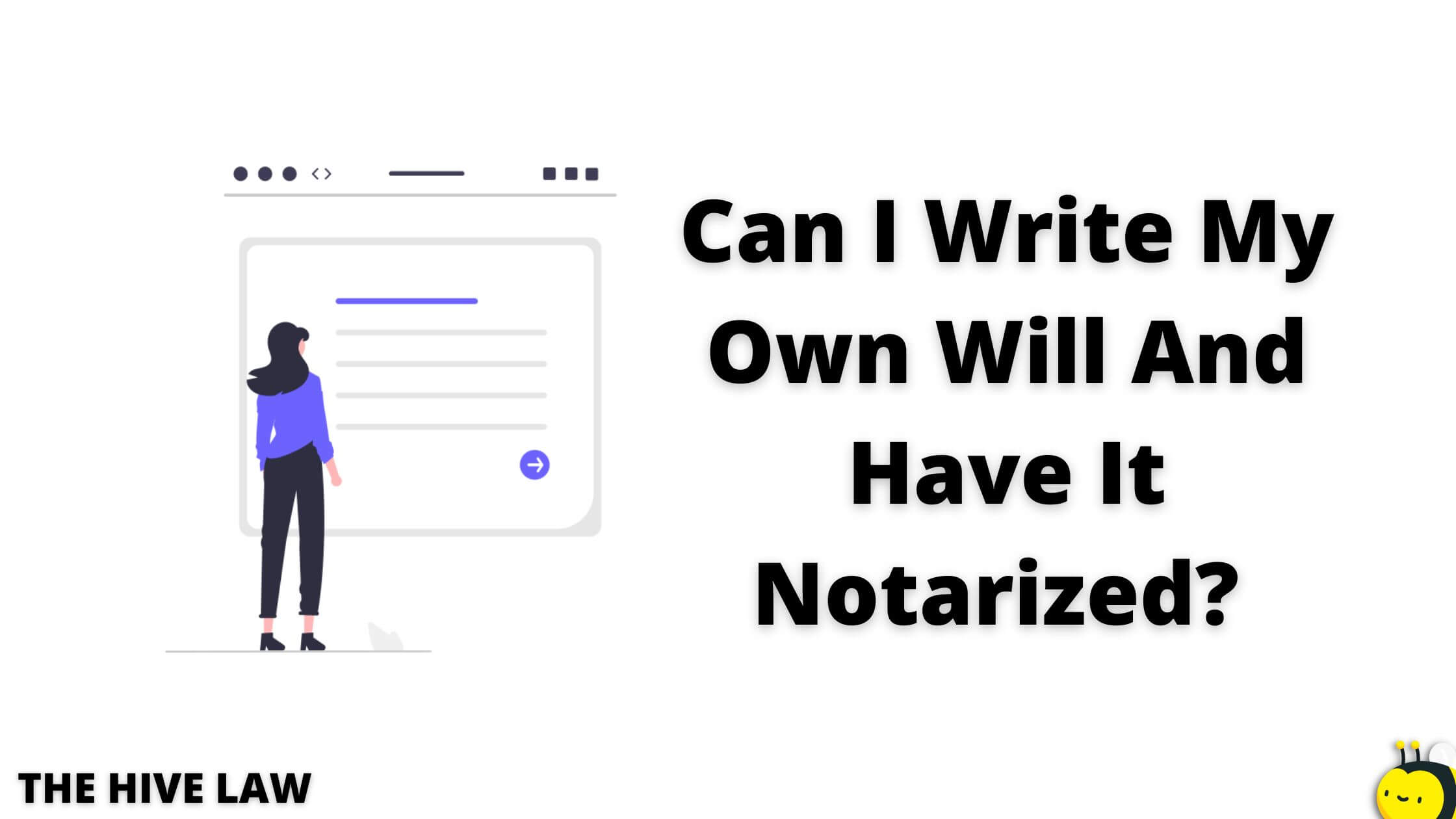Planning for the future is a crucial step in ensuring that your assets and final wishes are handled according to your desires. One of the most common questions people ask is, "Can I write my own will and have it notarized?" While drafting a will may seem like a daunting task, creating your own will can be a straightforward and cost-effective way to take control of your estate planning. However, there are important considerations to keep in mind to ensure your will is legally valid and enforceable.
In this detailed guide, we will explore the process of writing your own will and whether notarization is necessary or sufficient to make it legally binding. From understanding the components of a valid will to the role of witnesses and notaries, we’ll walk you through everything you need to know. By the end of this article, you'll have a clear understanding of what it takes to create a self-written will and the steps to ensure it meets legal requirements in your jurisdiction.
Whether you're looking to save on legal fees or simply want a hands-on approach to estate planning, writing your own will is an option worth exploring. However, it's essential to familiarize yourself with state laws and specific legal requirements to avoid potential disputes or complications. Let’s dive into the details to answer the question, "Can I write my own will and have it notarized?" and equip you with the knowledge to make informed decisions.
Table of Contents
- What Is a Will?
- Why Is a Will Important?
- Can I Write My Own Will?
- What Are the Legal Requirements for a Will?
- Does a Will Need to Be Notarized?
- Benefits of Notarizing a Will
- How to Write Your Own Will
- Can I Write My Own Will and Have It Notarized Legally?
- What Should I Include in My Will?
- Common Mistakes to Avoid When Writing a Will
- Should I Consult a Lawyer?
- How to Update a Self-Written Will?
- Can a Handwritten Will Be Notarized?
- What Happens If a Will Is Not Valid?
- Frequently Asked Questions About Wills
What Is a Will?
A will, also known as a last will and testament, is a legal document that outlines how a person's assets, property, and final wishes should be handled after their death. It allows individuals to designate beneficiaries, appoint an executor to manage their estate, and specify guardianship for minor children if applicable.
Having a valid will ensures that your wishes are respected and reduces the likelihood of disputes among family members or other heirs. Without a will, your estate may be distributed according to state intestacy laws, which may not align with your preferences.
Why Is a Will Important?
Writing a will is critical for anyone who wants to have control over what happens to their assets and loved ones after they pass away. Here are some key reasons why having a will is so important:
- Ensures your property is distributed according to your wishes.
- Protects your family and loved ones from unnecessary legal complications.
- Allows you to name a trusted executor to manage your estate.
- Provides clarity and reduces conflicts among heirs.
- Enables you to appoint guardians for minor children.
Can I Write My Own Will?
The short answer is yes, you can write your own will. However, whether it will be legally enforceable depends on meeting certain legal requirements. Self-written wills, also known as holographic wills, are acceptable in many states, but they must adhere to specific guidelines to be valid.
While drafting your own will can save time and money, it's important to proceed with caution. A poorly constructed will may lead to disputes, legal challenges, or even invalidation. Following a structured process and understanding state laws is key to creating a legally binding document.
What Are the Legal Requirements for a Will?
Each state has its own laws governing the requirements for a valid will. However, some general legal requirements apply universally:
- The testator (person writing the will) must be of legal age, usually 18 or older.
- The testator must be of sound mind and capable of making decisions.
- The will must be in writing (typed or handwritten, depending on state laws).
- The will must be signed by the testator.
- Witnesses are often required to sign the will, attesting to its authenticity.
Understanding these requirements is crucial when answering the question, "Can I write my own will and have it notarized?"
Does a Will Need to Be Notarized?
Notarization is not a universal requirement for a valid will. However, in some states, notarizing a will can make it "self-proving," which means the probate court will accept it without requiring witnesses to testify. This can simplify the probate process significantly.
It's important to check your state's laws to determine whether notarization is necessary or beneficial for your will.
Benefits of Notarizing a Will
Although notarization is not mandatory in most cases, it offers several benefits:
- Reduces the risk of challenges to the will's validity.
- Streamlines the probate process by making the will self-proving.
- Provides an additional layer of authenticity and security.
How to Write Your Own Will
Creating your own will involves careful planning and attention to detail. Follow these steps to draft a self-written will:
- Start with a clear heading, such as "Last Will and Testament."
- Identify yourself and state your intent to create a will.
- List your assets and designate beneficiaries.
- Appoint an executor to manage your estate.
- Include any specific instructions or conditions for asset distribution.
- Sign the will in the presence of witnesses.
- Consider notarizing the will for added security.
Can I Write My Own Will and Have It Notarized Legally?
Yes, you can write your own will and have it notarized, but notarization alone does not guarantee its validity. To be legally enforceable, the will must meet all state-specific requirements, including the presence of witnesses in most cases. Notarization is an additional step that can enhance the will's authenticity but is not a substitute for legal compliance.
What Should I Include in My Will?
A well-constructed will should include the following elements:
- Identification of the testator (your name and personal details).
- A declaration stating the document is your will.
- Details of your assets and how they should be distributed.
- Names of beneficiaries and their relationship to you.
- Appointment of an executor and their responsibilities.
- Instructions for guardianship of minor children (if applicable).
Common Mistakes to Avoid When Writing a Will
When drafting your own will, avoid these common pitfalls:
- Failing to comply with state laws and requirements.
- Using vague or ambiguous language.
- Forgetting to update the will after major life changes.
- Not including a residuary clause to address unallocated assets.
- Overlooking the importance of witnesses and notarization.
Should I Consult a Lawyer?
While writing your own will is possible, consulting a lawyer can provide peace of mind and ensure your document is legally sound. An estate planning attorney can help you navigate complex situations, such as blended families, significant assets, or unique distribution requests. Investing in professional advice can save your heirs time and stress in the long run.
How to Update a Self-Written Will?
Life circumstances change, and so should your will. To update a self-written will, you can either create a codicil (an amendment) or draft a new will entirely. Ensure the updated document complies with state laws and includes a statement revoking previous wills to avoid confusion.
Can a Handwritten Will Be Notarized?
Handwritten wills, or holographic wills, can be notarized in some states, but notarization alone does not make them valid. They must meet state-specific requirements, such as being entirely written and signed by the testator. Witness signatures may also be required, depending on the jurisdiction.
What Happens If a Will Is Not Valid?
If a will is deemed invalid, the deceased's estate will be distributed according to state intestacy laws. This can lead to outcomes that may not align with the deceased's wishes, such as equal distribution among heirs or exclusion of certain individuals. Ensuring your will is valid is essential to avoid such scenarios.
Frequently Asked Questions About Wills
Here are some common questions people have about writing and notarizing their own wills:
- Can I write my own will and have it notarized if I don’t have witnesses? In most states, notarization does not replace the need for witnesses. Check your local laws.
- Is a will valid without notarization? Yes, a will can still be valid without notarization if it meets all other legal requirements.
- How much does it cost to notarize a will? Notary fees vary by state but are typically minimal, ranging from $5 to $15 per signature.
By following this comprehensive guide, you can confidently answer the question, "Can I write my own will and have it notarized?" and take the first steps towards creating a legally sound estate plan.
You Might Also Like
The Missionary Sex Pose: A Timeless ConnectionHow To Tell If A Pineapple Is Ripe: A Comprehensive Guide
The Ultimate Guide To The Best Beaches In The US
Discovering The Capital Of New Jersey: A Comprehensive Guide
Understanding The World Of Phone Providers: A Comprehensive Guide
Article Recommendations

